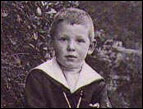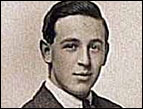INSIDE NARNIA
Saving C.S. Lewis
By David Kithcart
The 700 Club
CBN.com
– You may know him as the prolific author of the children’s fantasy series The Chronicles of Narnia. The soon to be released film of the series’ book The Lion, the Witch and the Wardrobe is sparking renewed interest in the late Christian writer C.S. Lewis. But, do you know how he came to Christ? We talked to various scholars including Lewis’ stepson to get the story behind the storyteller.
C.S. Lewis, who went by the nickname of “Jack” all of his life, grew up with his older brother Warnie in Belfast, Northern Ireland.
 “His grandfather was a minister, so he had that tradition,” says Don King, Professor of English at Montreat College in North Carolina. “He had an understanding of Christianity. But he didn’t really grapple it to his soul until much later.”
“His grandfather was a minister, so he had that tradition,” says Don King, Professor of English at Montreat College in North Carolina. “He had an understanding of Christianity. But he didn’t really grapple it to his soul until much later.”
The Reverend Dr. Malcom Guite is the chaplain of Girton College in Cambridge, England. “From very early on, Lewis had what we would probably now want to call mystical experiences,” says Dr. Malcolm Guite. “He had these stabs of joy and longing. He tells about seeing a little model of a garden that his brother had made standing under a flowering current bush and how the memory of that pierced him with a kind of longing.”
But, the beginnings of Lewis’ faith suffered with the death of his beloved mother.
“She had been a bulwark,” says King. “She had been someone that he relied upon. Her faith was his faith. She died when he was ten years old. That began a rather gradual erosion of his own faith until he studied under his great teacher W.T. Kirkpatrick -- his great tutor. Kirkpatrick was an atheist. Lewis eventually adopted Kirkpatrick’s point of view.”
Jack enlisted in the Army and fought in World War I. He experienced all of the horrors inflicted on soldiers in trench warfare. Afterward, as he studied at Oxford University. His journey away from faith was now complete.
“He went through the whole process of being the angry atheist coming out of the first World War,” says Douglas Gresham, Lewis’ stepson.
“In Lewis’ early writings -- the poems in spirits in bondage -- what we find there is a person who on the one hand denies God, but on the other hand hates God,” says King. “So he’s living in, as he refers to it, a world of contradictions. He’s angry about what’s happening to him, and he’s angry about what he sees happening in the world. He blames God. Yet at the same time he doesn’t want to believe in God.”
“One of the interesting things that Jack discovered when he first went to Oxford was that there are many people whom he really got on with very well,” says Gresham. “After a year or so he suddenly began to realize that the people he liked all happened to be Christians.
“He had this intensely, rational, logical mind. If he liked someone he would really want to figure out why he liked them. He found that it was the way they lived their lives that made him find them attractive.
When he discovered the people who lived these lives were Christians, he must have had to start thinking, Well, maybe there’s something to it after all because it seems to work.”
Author Frederica Matthews-Green says, “His pursuit of truth made him uncompromising. He wouldn’t settle for Christianity when it sounded like a silly story someone was making up.”
 “Lewis had a real difficulty reconciling his interest in myths and Norse sagas,” says author Eric Metaxas. “He really loved that kind of stuff but he was also a rationalist. He was a modern man in 1931, and he only wanted to believe things that were actually true.”
“Lewis had a real difficulty reconciling his interest in myths and Norse sagas,” says author Eric Metaxas. “He really loved that kind of stuff but he was also a rationalist. He was a modern man in 1931, and he only wanted to believe things that were actually true.”
Matthews-Green concurs, “C.S. Lewis’ journey to faith is like a two-stage rocket. One level fired off and then the next level fired off. He first had to go from atheism to a belief in the existence of God.”
“He soon became a theist,” says Gresham. “He suddenly realized that there is no other answer that works. There must be a God.”
“Almost more difficult was from a belief in God to a belief in Jesus Christ,” says Matthews-Green.
Lewis loved taking long, extended walks with his friends. Many times, their conversations turned toward belief in God and faith in Jesus Christ.
“You can imagine late at night, after dinner, C.S. Lewis is walking with [J.R.R.] Tolkien, the soon-to-be author of the Lord of the Rings,” says Metaxas. “Tolkien, who was already a Christian, was explaining to Lewis that the Christian story is the world’s only true myth.”
Gresham says, “When he was presented with the true myth, the one that really happened, he rejected it. The reason he rejected it was because it really happened, because people were telling him that it really happened. It wasn’t just a story. Because that knowledge suddenly demands from you a reaction. A reaction of choice. To believe it or to reject it.”
“Somehow what Tolkien had described to him that night sunk in a couple of days later,” Metaxas says.
Two days later Jack was leaving his home in Oxford, the Kilns, for a trip to the zoo in his brother motorcycle sidecar. At some point during that ride, Lewis finally came to a decision about Jesus Christ.
“Lewis couldn’t be a Christian until he grasped this astonishing truth that in Christ these two disparate things are one,” says Dr. Malcom Guite. “The logos, the Word, the only faintly apprehensible glory of God, the logos is made flesh. Or as Lewis put it beautifully, myth is made history.”
“He lived the Christian life, minute-by-minute, day-by-day,” says Gresham. “He observed and listened and studied what Jesus said and then went out and did it, probably better than anyone else I have ever met in my life.”
CBN.com special Narnia section
CBN IS HERE FOR YOU!
Are you seeking answers in life? Are you hurting?
Are you facing a difficult situation?
A caring friend will be there to pray with you in your time of need.